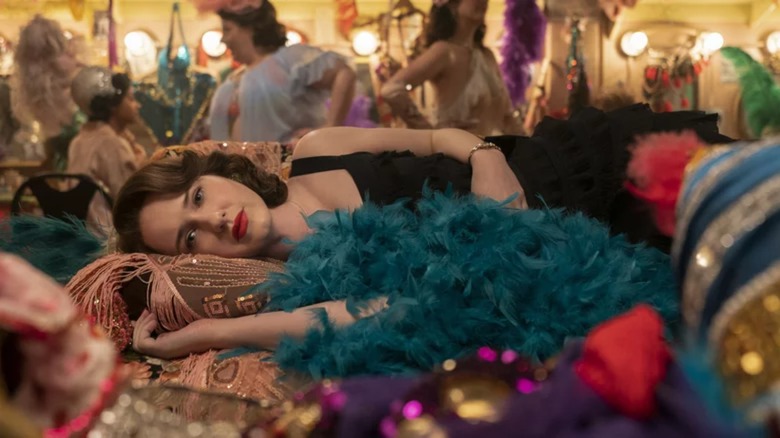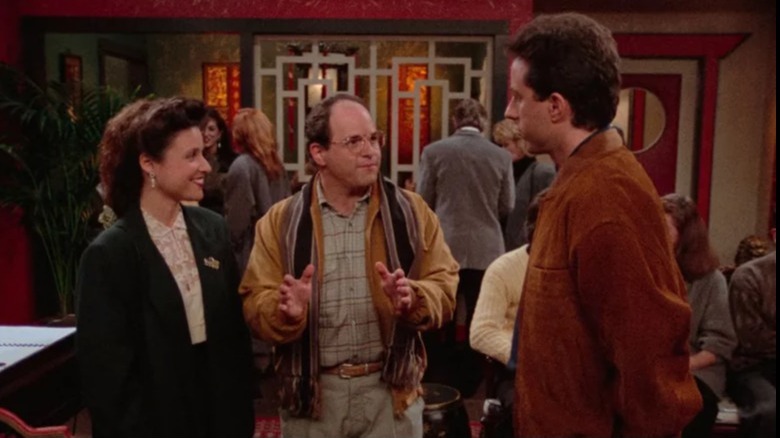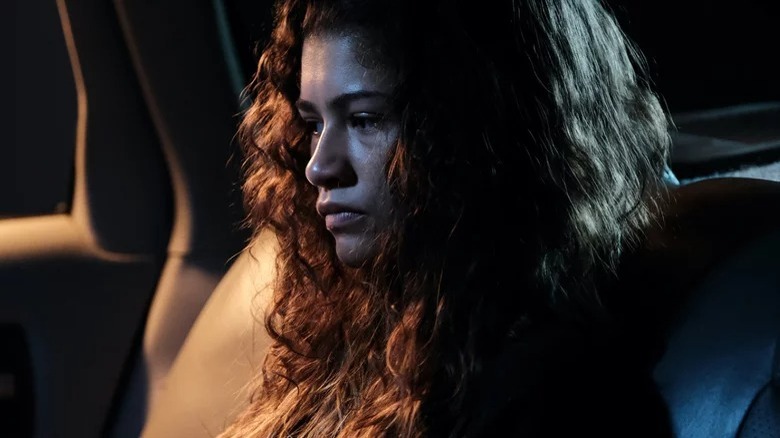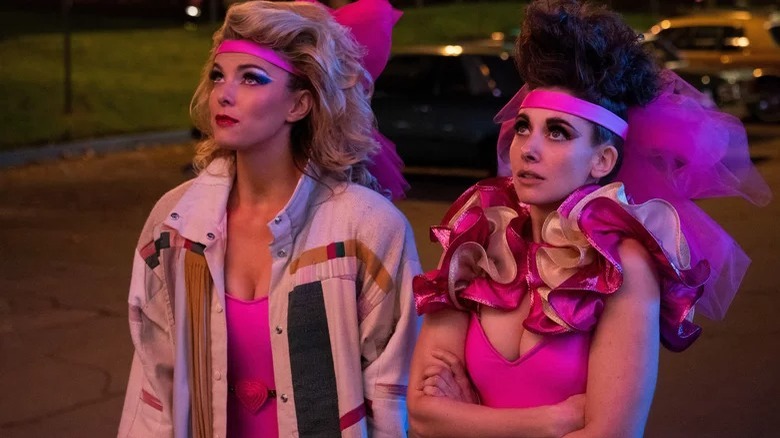New Media Has Become Old Media Again, And It's Funny In The Saddest Way Possible
Once upon a time, streaming was the future of television. Now, it's starting to look like the past, while the future, hilariously, looks like the TV we used to know. Case in point: today, Amazon Studios announced its intentions to get into the syndication game, with The Hollywood Reporter noting that the venture will be under the new banner of Amazon MGM Studios Distribution.
Syndication is, of course, a process that's been a part of linear television for decades, one that involves selling the rights to a title to other networks that will air reruns. Think "Supernatural" replaying on TNT all the time, or "Frasier" seemingly being available to watch on one channel or another at any given moment. THR says the deal will be made with MGM distribution partners and will feature some major shows and films including "The Marvelous Mrs. Maisel," "Hunters," and "Borat Subsequent Moviefilm."
"Pioneering the distribution of Amazon Originals for Amazon Studios is an exciting opportunity to bring fresh, never-before available quality content to audiences around the globe," MGM distribution head Chris Ottinger told the outlet. Ironically, though, while the TV syndication move might feel pioneering for Amazon (remember when they just sold books?), it's a strategy that's nearly as old as the medium itself. It's also one of many dependable strategies being presented as a hot new thing in Hollywood, roughly a decade after the streaming wars began.
News flash: syndication deals make money!
Last year, in the midst of some very public economic woes, Netflix reportedly considered getting into bed with the syndication model, with Bloomberg reporting (via ComicBook) that the streamer was thinking about putting some of its older Netflix Originals on broadcast networks in reruns. And while Warner Bros. Discovery hasn't used the term syndication to describe its recent, headline-grabbing content reshuffle, the company is reportedly licensing several HBO and HBO Max programs to FAST streamers. FAST stands for Free, Ad-Supported Streaming and includes streamers like Tubi, The Roku Channel, and FreeVee, among others.
All of this, hilariously, feels a bit like when someone gets too stoned and accidentally reinvents a basic concept — like freeways, or doctors — from the ground up. Streaming is great, I can picture these execs saying in a brainstorming session, but what if we were able to create more value from these shows by running them again in a linear form, or on a platform with commercials? Well, I have good news for you: that definitely already exists.
With the right title and schedule spot, a syndication deal can create a huge second life for a series or film — and can prove extremely lucrative for those involved in the deal. Larry David and Jerry Seinfeld's beloved sitcom "Seinfeld," for example, is still a cash cow making billions of dollars (with a b!) decades after it ended its original run. In recent years, though, companies have invested in deals to build a "streaming home" for old series instead, with HBO Max spending at least $600 million to get "The Big Bang Theory" and making a similarly outrageous deal for the rights to "Friends." NBCUniversal, meanwhile, paid $500 million to nab "The Office" from Netflix in 2019.
Is streaming just becoming cable again?
It's obvious that people love to rewatch their favorite shows again and again. Hollywood has figured this out but still seems to be figuring out how to capitalize on it properly under subscription-based models. The new Amazon and MGM deal, as Ottinger puts it, "will break through the current sales mold by creating custom packages that will fulfill our client's individual content needs." The deal is also set to include some MGM series like "The Handmaid's Tale" and "Fargo," per THR.
Again, these are terms we've heard before: the clients in question in this example might be distributing partners rather than viewers, but the buzzwords "custom packages" call to mind cable packages of the pre-streaming era. These, too, are making a comeback under a rebrand: if you sign up for Disney+ these days, you'll be prompted to consider a bundle with Hulu and ESPN. Showtime is set to share its library with Paramount+, HBO Max is famously due to make an unholy hybrid with Discovery's unscripted slate this month, and carte blanche, bundle-based offerings like Sling and YoutubeTV continue to function as cable alternatives.
Streaming has appeared to be collapsing into itself like a star becoming a supernova for a while now, and at almost every turn, the proposed solution to its problems seems to be a return to the TV of yesteryear. Aside from the rise in syndication deals, ad-based viewing options, and cable package-esque bundles, streamers have also recently experimented with a return to live and weekly release TV, not to mention the idea of actually putting their movies in theaters. Plus, there's the fact that the shows that do still make a splash on linear TV — like "Euphoria," "House of the Dragon," and "Yellowstone" — do big numbers and get fans talking.
The promise of streaming has lost its shine
In short, the future of TV looks like the past, and while that might turn out to be a good thing, the path to this realization has been a rocky one that's seen plenty of artists left out in the cold. Streamers have developed a tendency to cancel already-greenlit shows and to yank shows from streaming when no alternative viewing format for them exists. Often, works by marginalized filmmakers seem to be the ones losing out when this happens, and it's all because a handful of execs spent years pretending the streaming business was a sea of gold coins everyone could swim around in like Scrooge McDuck.
Between Netflix's restructuring in response to its subscriber loss, HBO's cutthroat cost-cutting methods, and equally depressing scaledowns by companies like AMC and Showtime, this past year has left the future of media hanging in the balance. Whenever we do find a way forward, it might involve looking back, but I'm still hopeful that positive parts of the streaming boom's influence will remain even if these companies reinvent the wheel entirely. For a while, streaming was a place for bold new ideas, freedom from network TV censorship, and increased diversity on screen and off. If TV can keep giving us those great things, I'll happily buy whatever bundle with a plus sign in its name that you put in front of me. Just please, God, don't make me sign an annual contract.



